SEVEN PSYCHOPATHS: You Can Have Your Criminals & Satirize Them, Too
There will always be an audience for crime movies: the thrill of seeing someone break the law - and seeing the costs that come with law-breaking - is great fuel for the conflict necessary to good storytelling. Like any familiar genre, the crime movie also poses an alluring challenge to filmmakers: how do you take those familiar elements and themes and make them feel fresh? Not every filmmaker tries to answer that question but the ones who do have at least have a chance at bringing a fresh vibe to the old archetypes. And that's exactly what Martin McDonagh has done with Seven Psychopaths, a film that joyfully indulges in the elements of the crime film while also subtly sending them up. The catalyst of the story is Marty (Colin Farrell), an L.A.-based screenwriter who wants to write a script about the title subject but spends more time avoiding work, drinking and goofing off with his out-of-work actor pal Billy (Sam Rockwell). He doesn't know it but inspiration is about to strike in a big way for reasons he can't foresee.The reason
And that's exactly what Martin McDonagh has done with Seven Psychopaths, a film that joyfully indulges in the elements of the crime film while also subtly sending them up. The catalyst of the story is Marty (Colin Farrell), an L.A.-based screenwriter who wants to write a script about the title subject but spends more time avoiding work, drinking and goofing off with his out-of-work actor pal Billy (Sam Rockwell). He doesn't know it but inspiration is about to strike in a big way for reasons he can't foresee.The reason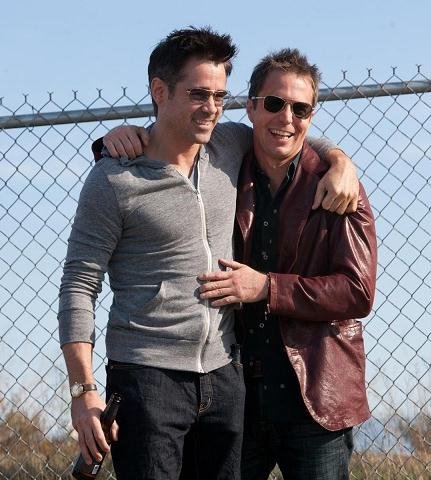 is simple: Billy is embroiled in a scam with pensioner Hans (Christopher Walken). This duo steal dogs from their owners, waits for the owners to put up a reward notice and then returns the dogs to get the cash. It's a pretty lucrative scam, at least until they pick up a dog that belongs to Charlie (Woody Harrelson). Charlie is a crime boss who is really attached to his dog and is willing to put a lot of muscle and bullets into getting the dog back. He lashes out, Billy and Hans are forced to go on the run and Marty finds all the script material he ever wanted while trapped in the middle.
is simple: Billy is embroiled in a scam with pensioner Hans (Christopher Walken). This duo steal dogs from their owners, waits for the owners to put up a reward notice and then returns the dogs to get the cash. It's a pretty lucrative scam, at least until they pick up a dog that belongs to Charlie (Woody Harrelson). Charlie is a crime boss who is really attached to his dog and is willing to put a lot of muscle and bullets into getting the dog back. He lashes out, Billy and Hans are forced to go on the run and Marty finds all the script material he ever wanted while trapped in the middle.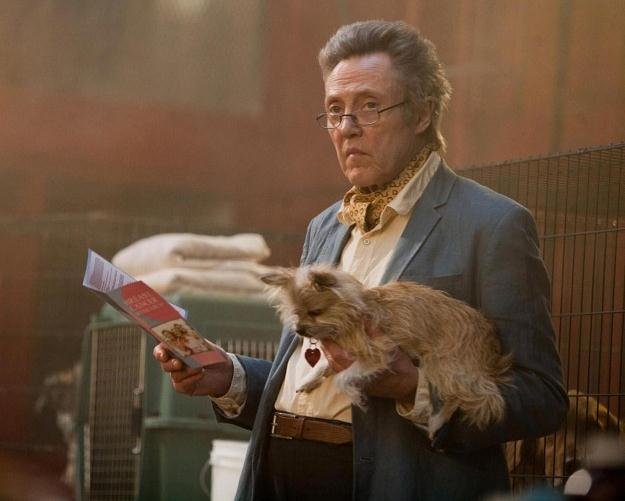 In terms of the plot setup, Seven Psychopaths might seem like a throwback to the post-Tarantino wave of postmodern crime flicks from the mid-to-late '90s. However, it actually goes for a more honest, self-satirical variation of genre deconstruction by comparing the fantasy world of the crime film to the oft stranger and more poignant foibles of real life. Fo
In terms of the plot setup, Seven Psychopaths might seem like a throwback to the post-Tarantino wave of postmodern crime flicks from the mid-to-late '90s. However, it actually goes for a more honest, self-satirical variation of genre deconstruction by comparing the fantasy world of the crime film to the oft stranger and more poignant foibles of real life. Fo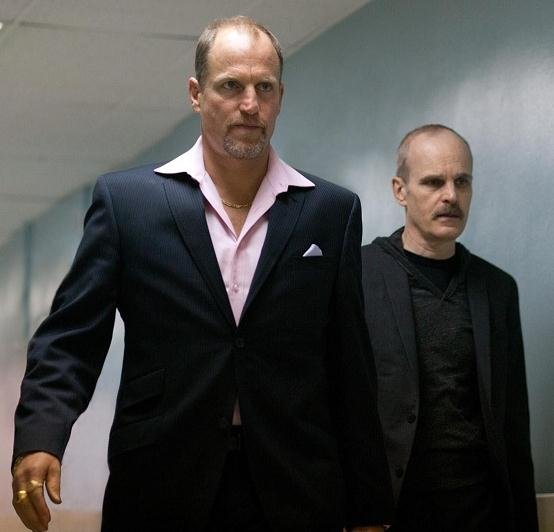 r example, McDonagh frequently dramatizes sections of Marty's script as characters discuss it, allowing for a ripple effect between the two as the audience shows how different perspectives can affect the same kind of material.The best example of this kind of scene comes when Billy pitches Marty and Hans on his version of Peckinpah-style "to the death" shootout, describing an absurdly over-the-top scenario as it is intercut with a hilarious dramatization of his concept. The combination of Rock
r example, McDonagh frequently dramatizes sections of Marty's script as characters discuss it, allowing for a ripple effect between the two as the audience shows how different perspectives can affect the same kind of material.The best example of this kind of scene comes when Billy pitches Marty and Hans on his version of Peckinpah-style "to the death" shootout, describing an absurdly over-the-top scenario as it is intercut with a hilarious dramatization of his concept. The combination of Rock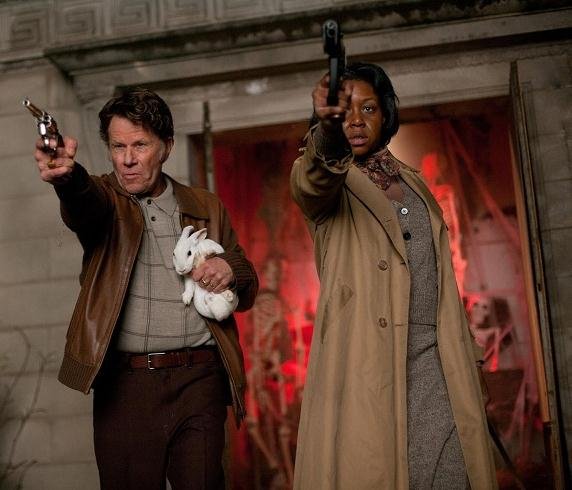 well's divinely maniacal delivery and the absurd yet beautifully-crafted action really sells the giddy rush of making up a story while also showing the ridiculous extremes the process can lead the creator to. It's also one of the funniest and most creative scenes in any movie this year.The film also goes on to contrast the difference between how situations happen in a story and how they go down in real life. Indeed, the finale of the film is full of such moments, like a moment where thugs pull a gun on Hans only to find him so defiantly uncooperative that it leaves them
well's divinely maniacal delivery and the absurd yet beautifully-crafted action really sells the giddy rush of making up a story while also showing the ridiculous extremes the process can lead the creator to. It's also one of the funniest and most creative scenes in any movie this year.The film also goes on to contrast the difference between how situations happen in a story and how they go down in real life. Indeed, the finale of the film is full of such moments, like a moment where thugs pull a gun on Hans only to find him so defiantly uncooperative that it leaves them  dumbstruck. There is also a "Mexican standoff" that effectively skewers that concept by delivering a finale that is hilarious and tragic by turns. In moments like these, Seven Psychopaths shows a playful flair as it sets up the audience to expect one thing and then delivers something surprising.Finally, Seven Psychopaths benefits from acting that lives up to the quality and complexity of its take on the crime genre. Farrell plays against type as a nebbish and turns in a well-studied comedic performance. Walken is given a uniquely inspired vehicle for the oddball comedic persona he's developed since the '90s and manages to give a performance that offsets the
dumbstruck. There is also a "Mexican standoff" that effectively skewers that concept by delivering a finale that is hilarious and tragic by turns. In moments like these, Seven Psychopaths shows a playful flair as it sets up the audience to expect one thing and then delivers something surprising.Finally, Seven Psychopaths benefits from acting that lives up to the quality and complexity of its take on the crime genre. Farrell plays against type as a nebbish and turns in a well-studied comedic performance. Walken is given a uniquely inspired vehicle for the oddball comedic persona he's developed since the '90s and manages to give a performance that offsets the  expected quirks with a soulfulness. Harrelson takes the crime boss character that would be hammy in lesser hands and finds different levels of cruelty, heartbreak and treachery that give it fresh energy.Best of all, Rockwell gives one of the best performances of 2012 as Billy. He's the kind of actor chameleonic enough that he often ends up playing support in larger ensembles but he's given a character here that allows him to show his range - and he runs with it. Billy is the kind of character you can't take your eyes off of because he's so joyously alive and unpredictable: he's making you
expected quirks with a soulfulness. Harrelson takes the crime boss character that would be hammy in lesser hands and finds different levels of cruelty, heartbreak and treachery that give it fresh energy.Best of all, Rockwell gives one of the best performances of 2012 as Billy. He's the kind of actor chameleonic enough that he often ends up playing support in larger ensembles but he's given a character here that allows him to show his range - and he runs with it. Billy is the kind of character you can't take your eyes off of because he's so joyously alive and unpredictable: he's making you 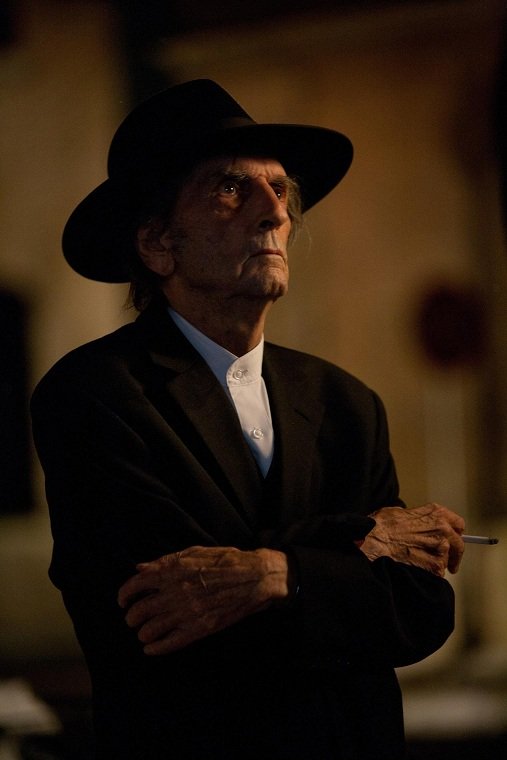 laugh one moment, scaring you the next, seeming like a charming naif in one scene and then flipping that perception with a moment of keen observation in a later moment (like a great bit where he offers his take on the old "eye for an eye leaves all blind" proverb). Rockwell handles each shift with precision, delivering an epic display of charisma and energy while making it look effortless. It's pure magic to watch him at work and he's so good you'll hope he gets more roles like this in future.Best of all, McDonagh confidently guides all this talent in a framework worthy of their skills. Seven Psychopaths is the kind of film that starts playfully pulling the rug out from underneath the audience in the first few minutes and continues to do so throughout the entire running time. However, McDonagh never
laugh one moment, scaring you the next, seeming like a charming naif in one scene and then flipping that perception with a moment of keen observation in a later moment (like a great bit where he offers his take on the old "eye for an eye leaves all blind" proverb). Rockwell handles each shift with precision, delivering an epic display of charisma and energy while making it look effortless. It's pure magic to watch him at work and he's so good you'll hope he gets more roles like this in future.Best of all, McDonagh confidently guides all this talent in a framework worthy of their skills. Seven Psychopaths is the kind of film that starts playfully pulling the rug out from underneath the audience in the first few minutes and continues to do so throughout the entire running time. However, McDonagh never  settles for empty showmanship: he makes sure the characters are the core of his story and arranges the twists and turns in a manner that allows them to reveal new sides of themselves.In short, Seven Psychopaths is the rare "have your cake and eat it, too" proposition that actually works: it shows respect for the dramatic allure of tough-guy situations while also confront how and why they would be painful or comic in the real world. It's a shame it's the kind of film most people will discover on home video because it offers the kind of creative take on genre filmmaking that deserves box office profits.
settles for empty showmanship: he makes sure the characters are the core of his story and arranges the twists and turns in a manner that allows them to reveal new sides of themselves.In short, Seven Psychopaths is the rare "have your cake and eat it, too" proposition that actually works: it shows respect for the dramatic allure of tough-guy situations while also confront how and why they would be painful or comic in the real world. It's a shame it's the kind of film most people will discover on home video because it offers the kind of creative take on genre filmmaking that deserves box office profits.


